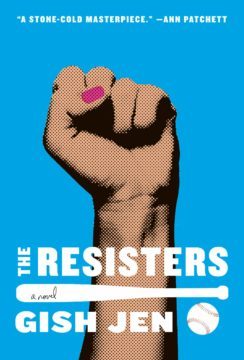Carole Burns in Ploughshares:
 For more than thirty years now, Gish Jen has been writing fiction that explores the American landscape while ranging across any boundaries expectations about literary fiction might try to impose: her five novels and many short stories are literary and entertaining; funny and serious; rich in characters with stories to tell. Whether she’s writing from the point of view of a Chinese American teenager in a primarily Jewish suburb, as in Mona in the Promised Land (1996), or the sharply observant and comic Hattie Wong in World and Town (2010), Jen creates characters who explore not just what it is to be American, but what it is to be human.
For more than thirty years now, Gish Jen has been writing fiction that explores the American landscape while ranging across any boundaries expectations about literary fiction might try to impose: her five novels and many short stories are literary and entertaining; funny and serious; rich in characters with stories to tell. Whether she’s writing from the point of view of a Chinese American teenager in a primarily Jewish suburb, as in Mona in the Promised Land (1996), or the sharply observant and comic Hattie Wong in World and Town (2010), Jen creates characters who explore not just what it is to be American, but what it is to be human.
As I was reading The Resisters (2020), her most recent novel, it felt, to me, like Jen’s most blatantly political work of fiction—and ostensibly it is. Set in a futuristic dystopia called “AutoAmerica,” its characters are beset by all the problems wrought by the failure of today’s governments to tackle the pressing issues of our time: climate change, inequality based on race and income, automation and resulting job losses, and the convenience of technology vs. privacy. Begun ten months after Trump took office, this dystopia, like most dystopias, is clearly a reflection of our contemporary world. It’s not only a novel about a community of resisters fighting the racist, classist, and environmentally unsound structures of their society—the book is itself a piece of resistance.
How much, I wondered, was it influenced by the nonfiction work she’d published since her previous novel?
More here.
